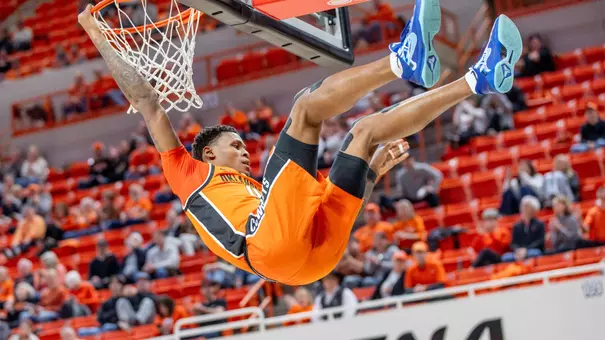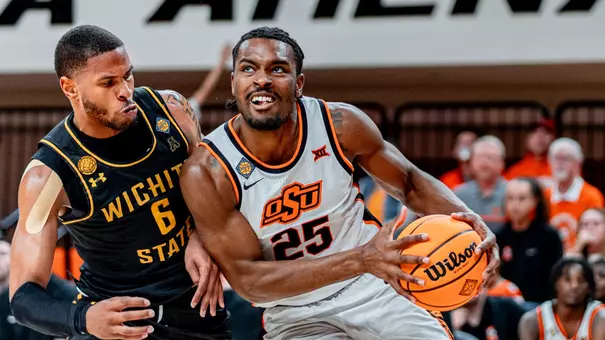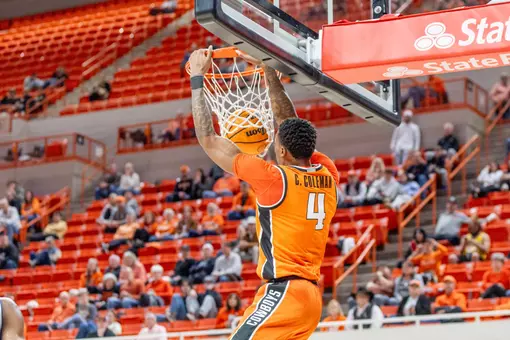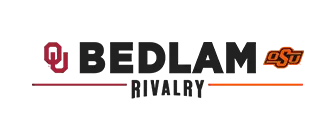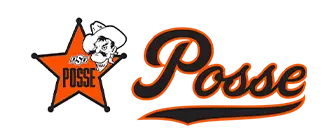Oklahoma State University Athletics
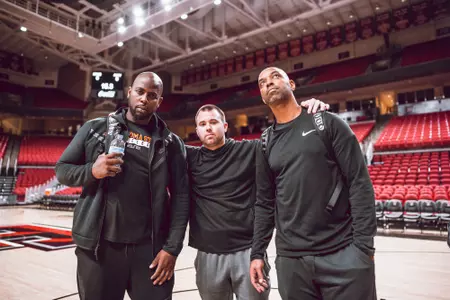
Life Of A Graduate Assistant: The Journey Of James Barrett And Matt Charles
November 29, 2022 | Cowboy Basketball
Having a job while attending college has become an accepted norm, even a standard, in today's age.
Some college students work for their school's offices, cafeterias or stores. Other students might work outside of their school's jurisdiction, and maybe work for a restaurant or grocery store nearby.
James Barrett and Matt Charles are no different.
They wake up every day and go to school and work. Their job is a bit unlike a normal college job, however. When they wake up, usually around 5 a.m., they go to Gallagher-Iba Arena and watch film with the men's basketball team. Then, they go to school, and come back for afternoon practice.
Barrett and Charles, who are graduate assistants for OSU's men's basketball team, are considered coaches of the team. Both men had different routes to get to where they are today, but both those paths led them to Stillwater, Oklahoma.
State Champion
James Barrett grew up in Brooklyn, N.Y., with a house full of sisters. As the oldest sibling, Barrett was tasked with keeping an eye on his sisters, in a rough part of the city.
Barrett started getting into sports early in his life, playing baseball and basketball.
"Youth sports was the avenue to be away from the violence from the neighborhood," he said.
Barrett said he got serious with basketball when he was around the age of 12. He played all through middle school, and eventually got an opportunity to play at Bishop Loughlin High School, where he was classmates with future Oklahoma State head coach Mike Boynton, Jr.
Barrett said he remembers Boynton as "the president of the school."
"He had a strong presence, kind of how he is now," Barrett said. "Throughout his evolution as a person, he still has a lot of the same values and attributes that he had at a young age. You could see him as a being a person that could lead a program because he led us as students and was always somebody that you could look up to."
Despite the three-year gap between them in school, Boynton said he remembers Barrett for his competitiveness and willingness to succeed.
"He had a great feel for basketball, in terms of how to play," Boynton said. "He could dribble, he could pass, he could shoot. He had a great competitive drive that really gave him a chance to be competitive in a competitive time in basketball in New York City at the time. He was a hooper, and that was a big deal at the time, growing up in New York City."
After Boynton graduated from Bishop Loughlin, Barrett transferred to Abraham Lincoln High School in Brooklyn. While there, Barrett was supported by a team chocked full of talent, led by Sebastian Telfair. Telfair was the team's point guard who went straight to the NBA after his tenure with Lincoln.
However, Telfair didn't pull it off on his own. Lincoln had the likes of Barrett and other future collegiate athletes en route to competing for the New York State Championship.
"We had a team of a lot of Division I guys," Barrett said. "We were very close, and we weren't really scared of anybody. To get to the state championship, we beat the No. 2 team in the country. They were No. 2 behind Lebron's team. That was a huge accomplishment to beat them in the state semi-finals."
Barrett and the Railsplitters went on to win the 2003 state championship in a close 75-73 game against Christ the King Regional High School. That was Barrett's final high school basketball game as a senior, and he started to look toward what was next for him, and what came next was a whirlwind of playing experience.
He started his collegiate basketball career with two different junior colleges. After that, Barrett went to the west coast to play for San Francisco State, where he played in packed arenas and faced off against the best competition in the NCAA. He finished his collegiate playing career at Sam Houston State, where he played against Oklahoma State in Gallagher-Iba.
"To have the opportunity to play here as a player, and then to work here as an adult, it's crazy how life goes in a circle," Barrett said.
AAU and the Journey to Stillwater
After concluding his playing career, Barrett set off to continue his career with basketball. His first stop: Home. Barrett's journey led him to a career in coaching for AAU teams in New York, starting with the New Heights organization. After spending time there, he switched to the Juice All-Stars, where he met Isaiah Whitehead.
Coaching Whitehead, Barrett said he believes that was the true start of his coaching career. Whitehead also played for Abraham Lincoln High School and became the first of seven players Barrett helped guide to the NBA in many of his stops. Jose Alvarado, Hamidou Diallo and NBA champion Jordan Nwora are three additional players Barrett has helped make it to the NBA.
After stops with the New York Rens AAU team and his former high school, Barrett's first true year as an assistant coach came in 2018, where he coached the Seward County Saints.
"We won the won the Kansas Jayhawk League, we won a regional tournament and got a chance to go to a national tournament," Barrett said. "That was my first year as an assistant, and I don't know how often that happens."
After a 28-6 record at Seward County, Barrett went in another direction, joining Monroe College and moving back to New York.
"We went to the national tournament as well, but it got stopped because of COVID-19," Barrett said. "But we still won our region. I made a list of the 50 most influential coaches in junior college basketball, which was another blessing."
After a successful and inspiring season with Monroe, Barrett was stuck out of a job in his third year due to COVID-19. Hoping to get back into a line of work, Barrett reached out to his old high school friend, Mike Boynton.
"I called Coach Mike, and I asked him about any opportunities here at OSU, and he told me there was a position open," Barrett said. "I told him I was interested. I started giving him my resume, and he was like 'you don't have to give me your resume, I know everything about you already.' After that, I was just waiting and making sure that everything was right for me to get out here. It was an easy decision because I've known him for so long. I was just grateful for the opportunity."
It didn't take Boynton much time to consider Barrett for the job, and soon later he was offered a graduate assistant position.
However, Barrett was in for a challenge he's never faced before. Prior to OSU, Barrett could always focus on coaching. Now, he was tasked with coaching and student responsibilities.
"Balancing school and work with the team is probably one of the hardest things that I've had to do," Barrett said. "Being in graduate school was just something I thought I would never even do. I got my GED in high school, so I didn't even know that I would graduate from high school, let alone get my bachelor's degree. It's just a great opportunity.
"Looking back at my family, there's nobody in my immediate family who even has a bachelor's degree, so it's like I have to do it to be the foundation for the younger generations of my family. I look at it as the bigger picture of being that person they can look to as a mentor and a role model for my younger family members and other people in my neighborhood."
Coach JB
Barrett got to work with OSU in the 2021-22 season, a dark year in OSU men's basketball lore. With the postseason ban hanging over everyone's head, it was easy to feel down after every loss. For Barrett, he's taken on the role of preventing these moments.
Barrett said he believes development is one of the most important aspects of the game, and the way toward doing so properly is finding what makes players tick and keeping them in a good mood.
"I help with scouting, I help with going through matchups during games, different things like that," Barrett said. "But I think all of that is small when it comes to the point of being able to help those guys get to where they need to be mentally."
Barrett's experience as a power forward has led to him working primarily with OSU forwards and big men during practices. Players have taken note of Barrett's commitment to the team and his winning experience.
Despite being a guard, Cowboy veteran Chris Harris Jr. can see what Barrett brings to the table.
"JB's played college basketball before, so I feel like he gives us the experience of what it takes to actually win and have a great winning program," Harris said. "He gives a lot of knowledge that we can soak in from his days of playing."
From the start of his time as OSU, Barrett has had opportunities to gain some knowledge from other coaches and players.
"Our coaches have so much experience," Barrett said. "Coming in every day and learning from those guys, they really don't hold back. If they see something they feel like can be better, they'll let you know. There's never a time where I've felt like I came in here and I'm not learning, it's a daily basis. With the guys, I learn from them as well because they're living in a different time, as far as social media, and some of the things they have to experience and go through in life. It's been a big learning experience from both sides."
As basketball season gets into full swing, Barrett said he hopes to see improvements made from the team from last year.
"I just want to be better," Barrett said. "We came in fifth last year, but I think we have the potential to be at least in the top-3 in the Big 12."
Humble Beginnings
Matt Charles played football and basketball all the way until high school, where he dropped football to focus on basketball.
A shooting guard and small forward, Charles went to a high school with a long history of success in its basketball program. His coach had more than 500 wins for his career and the program had winning seasons nearly every year. It came down to the success of the basketball team that Charles chose that team over the mediocre football team.
A long line of success for the basketball team doesn't always lead to the results players want, which was the case for Charles, who never won a state championship as a player. He and his team were upset in the first round of his junior year and failed to make it past the quarterfinals his senior year. At the end of his senior year, Charles knew his playing days were now behind him.
"I knew I wasn't good enough to play college basketball, I had that understanding of it," Charles said. "But I loved basketball so much. I still wanted to be involved and I knew I kind of wanted to coach one day."
After high school, Charles followed in the footsteps of his older brother, and attended Oklahoma State. His brother had a connection to the men's basketball team, through a friend who was a team manager. It didn't take much time or convincing for Charles to be added as a manager, a position he held all four years of his undergrad.
His first year with the program was also Boynton's first season as the head coach. Entering this year, it's their sixth year together.
At first, Charles thought being a manager would be easy work.
"I didn't know managers went to all the practices," Charles said. "I didn't know managers sat behind the bench for all the games. I just thought it was something like rebounding for a couple guys."
Charles quickly learned that wasn't the case.
The life of a manager is not glorious. Sure, managers get to spend time with players and coaches, and rebounding the ball for some players is one of the jobs given. Even so, Charles described a manager's position as "all the small things that don't get noticed and with no glory."
Life behind the scenes gave Charles a particular appreciation for how much work and effort goes into preparation for games and practices.
"Making sure the guys have a towel so they don't sweat on the floor and slip, mopping the floor, making sure they have water, just stuff you would never think about," Charles said. "And laundry every night, so the guys have clean practice or game jerseys for the next day."
That's just a small glimpse into what Charles participated in during his entire undergraduate years.
As a manager, one is the first in and the last out.
Managers were hit with arriving an hour early to practice, just in case a player wanted to get early shots up. They were also required to stay after practice until the last player finished shooting. Then they had to clean up.
With this reality, Charles was instilled with a harder work ethic than when he entered college.
What's next?
After graduating OSU in May 2021 with his bachelor's degree, Charles knew what the next logical step was to become a coach: Become a graduate assistant for a collegiate team. However, he wasn't sure where to go. In fact, he sent over 150 letters to Division I programs, asking for graduate assistant positions.
"I didn't care where it was in the country," Charles said. "I knew I wanted to continue this coaching route and I knew I couldn't be picky on where I could go. I never imagined it would be here."
Charles' search soon came to be easier than he thought it would and luckily for him, two GA positions at OSU had opened the year he graduated. Coach Boynton caught wind of Charles' aspirations to become a graduate assistant and offered him a position.
"What I distinctly remember is him being very particular about his assignments," Boynton said. "Whatever we gave him, whether it was laundry, picking up lunch for the staff or driving a recruit around campus on a golf cart. Everything he did, he put pride in doing it at a high, high level."
It was an easy choice for Charles who went on to start his work for the team just one month after graduating.
After his first year of graduate school, he was able to garner a system where he completes a load of work in class early in the week, and has more time to focus on his team responsibilities.
Charles credits a mutual understanding between his professors and him, which helps him succeed in and out of the classroom.
"Professors in this field are very understanding that sometimes we can't make class because we're on a plane or have a game," Charles said. "They're very understanding. Balancing it would be difficult if there wasn't understanding on the school end, along with the basketball end, but both sides have an understanding of what we have to do for both school and basketball."
With the team, his role has expanded with his new title. One of his jobs is to place food orders for the team after games, which is reminiscent of his manager days. Another odd job in need of completion.
Instead of strictly managerial tasks, Charles has come under the tutelage of coach Terrence Rencher, who is helping him become the coach he wants to be.
Assisting coach Rencher with scouting reports is one of Charles' most important jobs as a GA. His job is to watch five games of upcoming opponents and break down the personnel. He then takes note of what the team does and doesn't do. Coach Rencher makes edits, and the scout is distributed to players along with film of what to pay attention to.
With scouting opposing teams, comes a great deal of trust.
"At first, I will say it scared me," Charles said. "I just came from giving you water and towels to now telling you how to guard the guy on the other team. It's definitely a huge change of pace, which scared me at first, but in a good way where I'm cautious. I have to know my stuff. It's not like coach Mike's not watching. He's going to know if I'm messing up. It's good that it scared me.
"It's crazy to even think that I'm 23 years old, I was just a manager, I didn't play college basketball. Now, I'm telling these Division I college basketball players how to guard, attack and play against an opponent."
Working with OSU Legends (The Breakfast Club)
One of the perks of working with Division I athletes involves working with potential big-name players. One such player came and went through Stillwater in 2020, by the name of Cade Cunningham. Charles was a senior undergrad student, and still a manager, when Cunningham's notorious career at Oklahoma State started.
As a manager, Charles got a chance to work with and watch Cunningham the way that few other people have. Charles said he remembers Cunningham as being a great player to work with from the manager's perspective, specifically.
"He was probably one of the nicest guys on the team, respectful, cared about you as a person – that on a personal level was big for me, especially as a manager," Charles said. "Cade was one of the best for the managers. He always made you feel included, he made you feel like you're a part of it. He didn't belittle you even though he definitely could have, and no one would have said anything or had a problem with it. He was something special."
Cunningham isn't the only player he has worked with who made an instant impact on the culture of OSU's team.
He was a manager when Cowboy legends Cameron McGriff, Lindy Waters III and Thomas Dziagwa were starting to make their mark. He was around as a manager and was in his first year as GA when Isaac Likekele's career at OSU started and ended. He grew up with Avery Anderson III, Chris Harris Jr. and Kalib Boone, who were freshmen when Charles was still a manager.
He said the relationships he's built throughout the years are unlike any other he's ever had. He has special relationships with each of them, but with Anderson and Harris, Charles was introduced into what has become known as "The Breakfast Club."
"They come in at six or seven in the morning, depending on the day," Charles said. "We get about an hour of work in. I've rebounded for them during 'Breakfast Club' and now I'm working them out during 'Breakfast Club' for about a year and a half now. Sometimes, we work out for 20 minutes, but then we sit and talk about scheme, or basketball or anything. Those guys, we've been through a lot together and those relationships are really, really great."
At the end of every morning's "Breakfast Club" meeting, Harris said he feels the relationship he has with Charles grow.
"When you're around somebody for so long, you're bound to have a great relationship," Harris said. "You guys have to talk. I feel like our relationship is better off the court than it is on the court, because we look at each other as family. Off the court, we're just bonding and try to get to know one another as a basketball player and a coach."
Poke'd the Bears
The journey to Stillwater was a long and winding one for James Barrett, while Matt Charles seemed destined to spend six years with OSU. They find themselves wrapping up their second and final year as graduate assistants with the team, with different ideas for the future.
While the future for both men are still unwritten and undecided, one thing will bond them together until the end.
One moment they've spent together that stands above the rest – 2022's matchup against No. 1 Baylor at Ferrell Center in Waco.
At the end of a three-game road trip, in which the Cowboy's dropped the first two games to West Virginia and Texas Tech, OSU found itself 8-7 overall and 1-3 in conference play. Facing the powerful Bears in their home arena, led by LJ Cryer and Matthew Mayer, the odds were against the Cowboys.
Despite those odds, the Cowboys jumped to a 12-point lead after the first half and held onto it for a 61-54 win, giving the Bears their second loss of the season, and consecutive losses at home for the first time in nearly six years.
Bryce Thompson led the Cowboys with 19 points, as Moussa Cisse and Tyreek Smith combined for 14 rebounds and three blocks.
For the GA's, it was a moment they both considered as their favorite memory at Oklahoma State.
"You can't draw it up any better," Charles said. "First time in Oklahoma State history that we beat the No. 1 team on the road. With that team, with all the things going against us, that's probably my favorite memory."
With the team looking to move forward from last year, that game is one to remember and keep in mind as this season moves forward. The GA's have brought forward the effort to continue what went right against Baylor.
At the end of the season, Barrett and Charles will have served their two years with the team. The impact they've had on the program is immeasurable when it's all said and done.
For Boynton and the coaches, they will remember the gritty spirit the GA's brought to the table.
"They're extremely hard-working guys," Boynton said. "They're great people. They care about the kids and that's always one of the biggest measuring sticks for working with our staff. You have to care for these kids and be willing to go above and beyond and make sure you're helping them to be successful."
For Harris and the players, they recognize Barrett and Charles not only as their coaches, but as their friends and fellow students.
"Credit to them, man," Harris said. "School is nothing to play with… doing work and school, it's hard for me to do and I just became a senior. For them doing it for this long, I give them their flowers."
Wake up, go to work, go to class, go back to work and repeat. A norm in today's world for college students.
For James Barrett and Matt Charles, it's no different. T
he only contrast they have, is they're called "coach."



